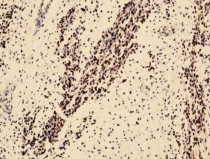ARG66768
anti-MyoD antibody [SQab20201]
anti-MyoD antibody [SQab20201] for IHC-Formalin-fixed paraffin-embedded sections and Human
Overview
| Product Description | Recombinant Rabbit Monoclonal antibody [SQab20201] recognizes MyoD |
|---|---|
| Tested Reactivity | Hu |
| Tested Application | IHC-P |
| Host | Rabbit |
| Clonality | Monoclonal |
| Clone | SQab20201 |
| Isotype | IgG |
| Target Name | MyoD |
| Antigen Species | Human |
| Immunogen | Synthetic peptide within aa. 1-100 of Human MyoD. |
| Conjugation | Un-conjugated |
| Alternate Names | PUM; MYF3; Myoblast determination protein 1; bHLHc1; Myogenic factor 3; MYOD; Myf-3; Class C basic helix-loop-helix protein 1 |
Application Instructions
| Application Suggestion |
|
||||
|---|---|---|---|---|---|
| Application Note | IHC-P: Antigen Retrieval: Heat mediation was performed in Tris/EDTA buffer (pH 9.0). * The dilutions indicate recommended starting dilutions and the optimal dilutions or concentrations should be determined by the scientist. |
||||
| Positive Control | Rhabdomyosarcomas tissue. |
Properties
| Form | Liquid |
|---|---|
| Purification | Purification with Protein A. |
| Buffer | PBS, 0.01% Sodium azide, 40% Glycerol and 0.05% BSA. |
| Preservative | 0.01% Sodium azide |
| Stabilizer | 40% Glycerol and 0.05% BSA |
| Storage Instruction | For continuous use, store undiluted antibody at 2-8°C for up to a week. For long-term storage, aliquot and store at -20°C. Storage in frost free freezers is not recommended. Avoid repeated freeze/thaw cycles. Suggest spin the vial prior to opening. The antibody solution should be gently mixed before use. |
| Note | For laboratory research only, not for drug, diagnostic or other use. |
Bioinformation
| Database Links | |
|---|---|
| Gene Symbol | MYOD1 |
| Gene Full Name | myogenic differentiation 1 |
| Background | This gene encodes a nuclear protein that belongs to the basic helix-loop-helix family of transcription factors and the myogenic factors subfamily. It regulates muscle cell differentiation by inducing cell cycle arrest, a prerequisite for myogenic initiation. The protein is also involved in muscle regeneration. It activates its own transcription which may stabilize commitment to myogenesis. [provided by RefSeq, Jul 2008] |
| Function | Acts as a transcriptional activator that promotes transcription of muscle-specific target genes and plays a role in muscle differentiation. Together with MYF5 and MYOG, co-occupies muscle-specific gene promoter core region during myogenesis. Induces fibroblasts to differentiate into myoblasts. Interacts with and is inhibited by the twist protein. This interaction probably involves the basic domains of both proteins (By similarity). [UniProt] |
| Cellular Localization | Nucleus. [UniProt] |
| Calculated MW | 35 kDa |
| PTM | Phosphorylated by CDK9. This phosphorylation promotes its function in muscle differentiation. Acetylated by a complex containing EP300 and PCAF. The acetylation is essential to activate target genes. Conversely, its deacetylation by SIRT1 inhibits its function (By similarity). Ubiquitinated on the N-terminus; which is required for proteasomal degradation. Methylation at Lys-104 by EHMT2/G9a inhibits myogenic activity. [UniProt] |
Images (1) Click the Picture to Zoom In
-
ARG66768 anti-MyoD antibody [SQab20201] IHC-P image
Immunohistochemistry: Formalin/PFA-fixed and paraffin-embedded Human Rhabdomyosarcoma tissue. Antigen Retrieval: Heat mediation was performed in Tris/EDTA buffer (pH 9.0). The tissue section was stained with ARG66768 anti-MyoD antibody [SQab20201] at 18°C - 25°C for 30 minutes.






